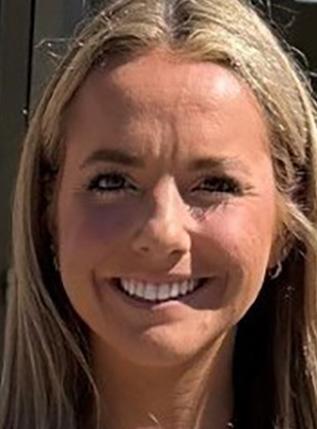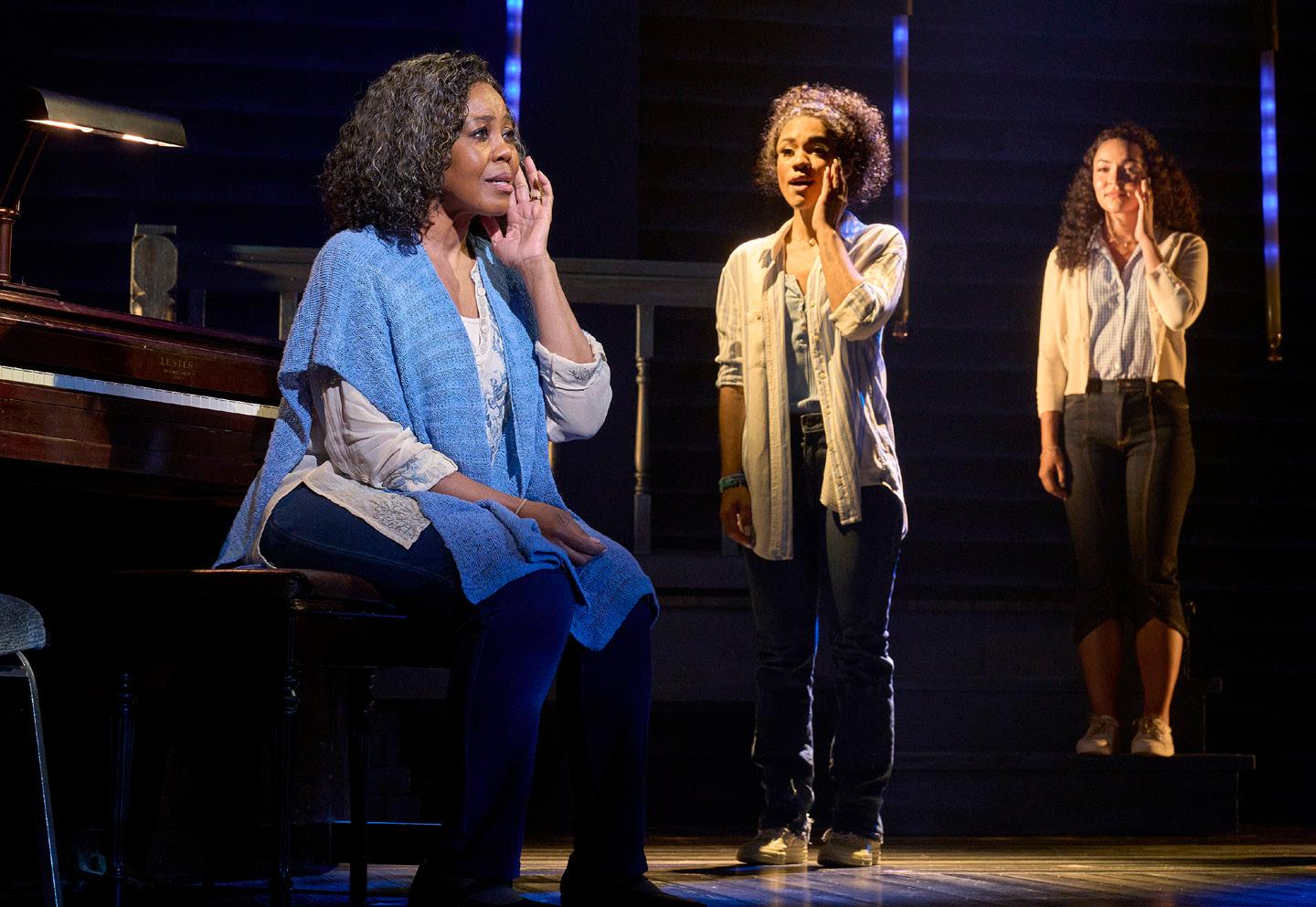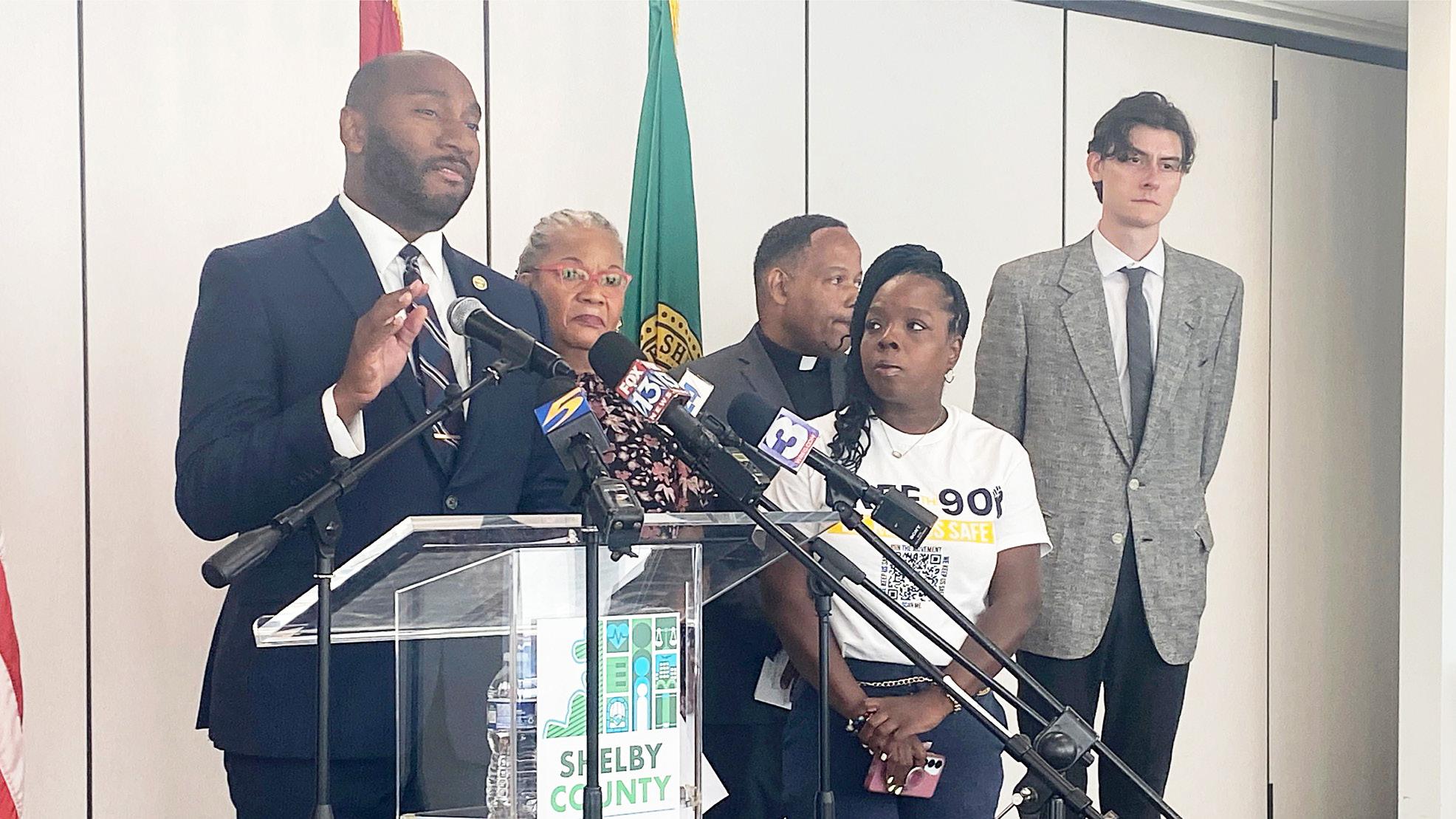


TRI-STATE DEFENDER








Wyatt, Tarrant and Combs LLP announced that Sandler Sowell, a second-year law student at the University of Memphis Cecil C. Humphreys School of Law, has been awarded the law firm’s Benjamin L. Hooks Law Scholarship.

degree from the University of Mississippi.
POSTMASTER: Send address changes to The Tri-State Defender, 1509 Madison Ave., Memphis, TN, 38104.
GENERAL INFORMATION: Inquiries may be submitted in writing or by calling (901) 523-1818 or by email. TELEPHONE: (901) 523-1818.
The Tri-State Defender (USPS 780-220) is published weekly. The Tri-State Defender 1509 Madison Ave. Memphis, TN, 38104. Second-class postage paid in Memphis, TN.
The Tri-State Defender is a member of The National Newspaper Publishers Association and the Tennessee Press Association.
by copyright. No materials herein may be reproduced without the written permission of the Publisher. (901) 523-1818 | 1509 Madison Ave, Memphis, TN 38104
The scholarship is given in honor of the late judge and Civil Rights leader Benjamin L. Hooks, who was a partner with the Wyatt law firm until his death in 2010. During his career, Hooks also served as a minister, the executive director of the NAACP, and as a member of the Federal Communications Commission.
Sowell is the eighth recipient of the Benjamin L. Hooks Law Scholarship, which will help to fund her law school tuition and course-related expenses. A top law student, Sowell is a member of the Association for Women Attorneys and the Tennessee Association of Criminal Defense Lawyers, Student Chapter.
“Dr. Hooks had a remarkable career in law and public service,” said Lee Harkavy, partner in charge of Wyatt’s Memphis office. “We are honored that Dr. Hooks was with our firm for many years, and we are pleased to honor Ms. Sowell with this scholarship.”
Former Memphis mayor Jim Strickland, now dean of the University of Memphis Law School, said the scholarship in memory of Hooks is important to the law school. “Not only do scholarships like this help us to recruit top law students, but they also help to retain them. My sincere thanks to the Wyatt firm for its generosity. And congratulations to Sandler, who deserves this honor.”
Sowell received her undergraduate
“With the support from this scholarship, my goal is to continue excelling in my studies until graduation and secure a position as a litigation attorney in Memphis,” Sowell said. “I am particularly drawn to the challenges and dynamic nature of litigation, as it requires strong analytical abilities, persuasive communication and the ability to be a strong advocate for future clients.”
“We
are honored that Dr. Hooks was with our firm for many years, and we are pleased to honor Ms. Sowell with this scholarship.”
— Lee Harkavy
Wyatt, Tarrant and Combs LLP maintains an active national practice with five offices located in Memphis and Nashville, Tennessee; Louisville and Lexington, Kentucky; and New Albany, Indiana.


isn’t born of sympathy, but gratitude — the kind that turns advantage into access for others.
By Judith Black Moore
Never needing help to be understood, to move through a building or to communicate with the world is a privilege, an invisible advantage most of us rarely think about. That privilege shapes how we see need and even how we give.
When choosing where to give, many of us naturally support organizations that enhance our lives like arts programs, environmental causes or civic groups that make the world more beautiful, informed and connected. Yet for many others, nonprofits are not about enrichment; they are about access, inclusion and survival.
There are different kinds of nonprofits. The large, familiar ones like the American Cancer Society, United Way and the NAACP tackle broad issues that touch many lives and define the public face of charity. Then there are quieter, more personal ones, often unseen, that work to make daily life possible. These targeted-impact nonprofits ensure access and inclusion for people with special needs by providing services that secure equal footing in society.
At first mention, accessibility might mean automatic doors, ramps and elevators. But equity in access and inclusion covers much more. For the more than 100,000 people in the Memphis area who have hearing loss, it means “hearing” without sound — being included in conversations and receiving information despite the inability to hear or hear fully.
At city meetings, you might notice sign-language interpreters standing to the side, hands moving in rhythm with spoken words. They are there because DeafConnect of the Mid-South fights

for equal access to civic life.
“We connect deaf individuals with the hearing world by providing ASL interpreting,” said Natasha Parks, CEO. “We advocate to businesses, educational institutions, medical services, legal services and other important agencies to encourage them to schedule ASL interpreters for the deaf community.”
In her work, Parks said accessibility means “ensuring every deaf individual has a full communicative experience in every public setting.”
That advocacy represents something larger than communication. It represents belonging. Yet despite their essential role, organizations that provide inclusion services rarely have the same funding opportunities as other nonprofits.
As Parks explained, “Traditional grants and funding from foundations can be difficult to get approved because disability can be seen as a niche issue and may appear to be hard to understand.”
People who don’t need special services rarely think about what it’s like to be among those who do. That gap in awareness can lead to stereotypes. When it comes to hearing loss, one of the biggest misconceptions is the belief that those who are deaf can’t live regular, capable lives, said Kate Gray, DeafConnect senior manager of operations and community engagement. Those mistaken ideas are often fueled by the privilege of not needing.
This is where targeted-impact nonprofits like DeafConnect come in. In addition to providing direct assistance, they dispel myths and train ambassadors to advocate for the populations

they serve.
To help others understand, Gray challenges us to test what navigating the world is like for those with special needs. “Walk in their shoes for just ten minutes ... close off all sounds; go to the store and ask for help and see firsthand how others respond.”
Imagine extending that challenge beyond deafness to living with a developmental delay, blindness or limited mobility.
What if every transaction, classroom experience or conversation depended on someone else’s willingness to include you?
The privilege of not needing help might make us view supporting these organizations as charity. But what if we saw that support differently — not as charity but as shared responsibility? What if it became a commitment to ensuring every citizen has the privilege
of a full and functional life?
As Memphis faces tightening budgets and health care costs rise nationwide, we must remember the quieter battles fought by nonprofits serving people with special needs. They are the ones safeguarding access and dignity every day. Targeted-impact organizations like DeafConnect are on the front line, making society whole, not just fair. Those of us who can hear, see, move and speak without barriers can help ensure that as tides shift and uncertainty sets in, nonprofits providing special assistance have the resources to continue fully serving the communities that depend on them.
This kind of support is about gratitude for the privilege of not needing. It’s about using that privilege not just to notice need but to close the gap for those who live with it every day.

By James Coleman TSD Contributing Writer
Voters could decide next year whether hundreds of Memphis Public Library employees should be reclassified as civil service workers. A supermajority of employees from the low-paid division are currently seeking to become members of the Communications Workers of America labor union.
During the Memphis City Council meeting Tuesday, Oct. 21, council member J.B. Smiley told assembled city workers he intends to introduce a charter amendment to leave the question to voters.
“We’re going to let the people decide. We’re going to bring up something at the next council meeting, and we’re going to talk about this issue. Then, we’ll see what happens,” Smiley said.
Smiley’s announcement came during public comments at the end of the meeting. It was prompted by a library employee who put the question to the assembled council.
“I would like to ask from each of you, if you are willing. Can you commit to
standing with labor? Can you commit to placing a referendum on the ballot today to change the employment status of library workers … ?” library employee Emilie Rodgers asked.
Library employees have engaged in months of campaigning in pursuit of a memorandum of understanding. Around 70% of the city division’s appointed employees have signed union authorization cards. Breaking a 60% threshold typically improves chances considerably.
Many library employees consider their current classification a misnomer. It lumps low-paid librarians, assistants, clerks and others into the same category as city division leaders, for example.
A charter amendment is one of two routes to reclassification. The other is through Mayor Paul Young’s office. Before Tuesday’s meeting, library workers were considering when to deliver their union authorization cards to the mayor. It likely would have been an unrealistic endeavor.
Young has already told employees that if they were reclassified as civil service, they would all be fired and then rehired. As appointed employees, they currently
serve at the discretion of the mayor.
The timing isn’t ideal either. The administration is currently embroiled in a lawsuit with its police and fire unions. The mayor is attempting to invalidate the existing agreements with the bargaining units. The city argues it is not legally required to engage in collective bargaining. Furthermore, Young claims that any agreement signed by a previous mayor is not binding and he shouldn’t have to abide by it.
Putting the item on the November 2026 ballot prevents library workers from pursuing futile paths. The only caveat: Council members informed the pro-union library employees they would still need to be fired and rehired if they join the union.
Grievances within the library system go beyond compensation. Chronically understaffed branches are also typically in a state of disrepair. Many have HVAC issues similar to those experienced by Memphis-Shelby County Schools in recent years. Systems are operable one day, offline the next.
The complaint was validated during the morning Libraries and Neighbor-
hoods Committee meeting. Council members discussed a resolution providing $2 million in funding for deferred maintenance improvements.
A citywide hiring freeze instituted by Young has only exacerbated issues within the library. Combined with high turnover, institutional knowledge is quickly evaporating along with morale. Evidently, they aren’t alone. Numerous city employees wearing pro-union T-shirts echoed many of the complaints later in the afternoon. Their message ran contrary to the administration’s perspective.
During the afternoon Budget Committee meeting, the city’s chief financial officer said he hadn’t noticed a difference in worker optimism.
“Right now, there’s a lot of stresses throughout the city from a variety of issues. Some internal to the city, some external to the city,” CFO Walter Person said. “I would say in general, I haven’t noticed any major downturn in morale. It’s about the same as it’s been.”
Person also informed the committee that the city is still considering hires of critical employees on a case by case basis.


“People are saying it’s going to end up in litigation. You know what? They’re probably right.”
— Mickell Lowery
By James Coleman TSD Contributing Writer
A realignment of Memphis-Shelby County Schools Board of Education elections is back on track after a twothirds majority of Shelby County commissioners voted to override a mayoral veto Monday, Oct. 27.
With the vote, all nine school board seats will be placed on the 2026 ballot. The 13 seats on the commission will also be up for grabs. Commissioner Mickell Lowery tipped the scales in favor of an override.
“All in all, I have been voting for and speaking about realigning these elections to a different year. I also put up recall legislation that this body did not pass, which I disagreed with. But the body spoke ... I’ve been consistent with that,” Lowery said.
Shelby County Mayor Lee Harris rejected the resolution Oct. 9. A majority of seven commissioners had approved the item with a 7-5 vote Sept. 22. At the time, Lowery was absent following the death of his father, former Memphis City Council Chairman Myron Lowery.
The resolution overriding Harris’ veto passed 8-4. Commissioners Mick Wright, Amber Mills, Edmund Ford Jr., Brandon Morrison, David Bradford, Michael Whaley and sponsor Britney Thornton joined Lowery in overriding the veto. Chairwoman Shante Avant, Miska Clay Bibbs, Charlie Caswell Jr. and Henri Brooks opposed the measure. With its passage, a lawsuit from the school board is likely. Realignment will curtail the terms of four members by two years. The resolution appears to
“To the person that said the mayor’s veto suppressed our vote, I agree with you. Don’t be surprised after you all leave if the mayor comes down here and starts patting some of my colleagues on their heads like little pets.”
— Edmund Ford Jr.
run afoul of Article XI, Section 9 of the Tennessee Constitution, which “restricts legislative power over the terms of local officials” like school board members, including “abridging” terms of office.
“People are saying it’s going to end up in litigation. You know what? They’re probably right,” Lowery said.
Members are awaiting a legal opinion from Tennessee Attorney General Jonathan Skrmetti on the matter.
Prior to the lopsided vote, Ford brought up a remark made during the public comment period. It alluded that members who voted against the override were doing so to curry favor with one person.
“To the person that said the mayor’s veto suppressed our vote, I agree with you. Don’t be surprised after you all leave if the mayor comes down here and starts patting some of my colleagues on their heads like little pets,” Ford said. “He may come down here after you leave and say, ‘Job well done. Here’s a Scooby snack for you.’”
The commissioner has waged a campaign of words against the mayor and some of his fellow commissioners after Harris’ attempt to revive a mothballed ethics commission. Ford saw it as an attempt to remove him from office
following his indictment for alleged kickbacks and money laundering at the beginning of the year. The ethics commission was not revived.
Nearly 30 speakers from a packed house took part in the public comments before the vote. The split was nearly even between those opposed to the veto or its override. For the most part, those opposed argued in favor of “respecting the democratic process.” Their counterparts, meanwhile, often parried that a realignment would “put the needs of children first.”
There were also several outbursts from the public after their comment period ended. One caught the attention of Avant, who asked for a pause during Ford’s comments. The request angered her colleague. He replied by suggesting that Avant was elected to her post to do the mayor’s bidding.
“We know why you became chair,” Ford said.
Avant quickly admonished her colleague.
“You are out of order,” Avant repeated. “Commissioner Ford will get his time back, his 30 seconds. He doesn’t have to be disrespectful to do that. The same respect you ask and demand, I am asking as well. I am not doing anything but asking to quiet the chamber so that
your voice can be heard.”
The chairwoman wasn’t the only member in Ford’s crosshairs. Despite voting on the same side of the issue, most of the ire was saved for Lowery.
The second-term commissioner is running for Harris’ job in the next general election, as the mayor is in his second and final term.
“As one person said, we are really looking at how one particular person votes,” Ford said. “Even if that person does the right thing, that does not qualify that individual to win a 2026 election.”
Lowery acknowledged his upcoming race. He also acknowledged the nature of the topic.
“It’s a divisive issue. It’s polarizing, at the end of the day,” Lowery said.
The effort to remove school board members is blowback from a decision to fire former Superintendent Marie Feagins in January. The school board voted 6-3 to remove Feagin, who had been on the job nine months, for alleged contract and policy violations.
Also in Monday’s meeting, commissioners approved a referendum ordinance that would allow recall elections of county officers and school board members. It also faces legal questions. There is currently no state law or charter authority for commissioners to engage in a recall. Therefore, the power would lie dormant until authorized by a state law amendment.
It passed 8-0-4 on a third and final vote. Voting in favor were Whaley, Clay Bibbs, Caswell, Thornton, Brooks, Lowery, Avant and Ford. Commissioners Mills, Wright, Morrison and Bradford abstained. Sugarmon is the sponsor.

By Candace A. Gray TSD Contributing Writer
When “The Notebook: The Musical” opens at the Orpheum Theatre Tuesday, Oct. 28, Memphis audiences will witness more than a love story. They will see the homecoming of a performer who has lived a story all her own. Sharon Catherine Brown, who stars as Older Allie in the touring production, is returning to the road for the first time in 26 years. Her last Memphis appearance was as Lucy in “Jekyll & Hyde.”
“I decided I was coming off the road to devote time to my family after that,” said Brown. “And now, all these years later, ‘The Notebook’ brought me back out. It’s my first tour in more than two decades, and I couldn’t think of a better city to come back to than Memphis.”
Brown’s life in show business began early, born and raised in Manhattan to two Broadway actors. Her father, Johnny Brown, best known as Bookman from the 70s TV show “Good Times,” and her mother, a seasoned performer, taught her that the entertainment world was equal parts artistry and business.
“My parents taught me it was a business first,” she said. “And that I’m not better than anyone else, and that you never walk on a set without greeting your crew; my father drilled that into me.”
Just like a family pizza business, for example, Brown credits her parents with keeping her grounded in their “family business,” but said she would be nowhere without her faith.
“I don’t take any glory away from God,” she said. “I pray for protection and for what’s meant for me. It took me a long time to actually pray and let God be God. That’s what’s kept me — my faith, my family, and knowing you can’t do it all alone.”
That humility and spiritual grounding have sustained her through de-

cades in a challenging industry. “Life is difficult,” she said. “You need people who genuinely want to see you do well and who will also tell you when you’re wrong. I was lucky to have that in my mother, who’s still with me today.”
Brown said she was also blessed to have been immersed in a world that felt normal to her but later realized how magical it was that her home was filled with legendary artists like Miles Davis, Cicely Tyson and Sammy Davis Jr., her father’s mentor.
After years in television, film and on Broadway, Brown eventually stepped away from touring. But her artistry never stopped evolving. Since turning 50, she’s taken on some of the most demanding roles of her career, including “Romeo and Juliet” and “Days of Wine and Roses.”
“Everything I heard about roles drying up after 50 just hasn’t applied to me,” she said. “I’m so blessed. It’s been abundant.”
One such role is that of Older Allie in
“The Notebook: The Musical.” Brown shares the role of Allie across generations, as three actresses portray the character’s youth, middle age, and later years. Though she admits she was once skeptical of multi-actor storytelling, the approach won her over.
“I’ve never been a fan of three different people playing one character, but this … this works beautifully,” she said. “The younger Allies and I studied each other’s mannerisms. It just clicked. And the Noahs did the same.”
Her collaboration with co-director and friend Michael Greif, with whom she’s worked for more than 20 years, has been especially meaningful.
“Michael knew this was my role before I did,” said Brown. “It’s the most challenging and different thing I’ve ever done, and he knew I could do it.”
The musical also carries quiet but powerful cultural significance. In this touring production, all three women portraying Allie are women of color.
“On Broadway, there were different
combinations of race between the Allies and Noahs, and very sophisticated audiences were sometimes confused,” Brown said. “But this version, this cast, feels right. It’s consistent, it’s honest and it reflects the world we actually live in.”
Brown is passionate about real inclusion in theatre, not performative gestures. “You can black out your square on social media for a day, but what else are you doing?” she asked. “Who are you hiring? How many people in the writers’ room are of color? That’s how you create equality. You make the change by creating the paycheck.”
Giving a chance is important to Brown but so is giving her all in a performance. It’s the hallmark of her approach.
“When you leave the stage, people should think an ambulance is waiting because you’ve left it all on the stage,” Brown said. “I come full so I can leave empty, having given everything I have to the audience so they leave full.”
Her passion for her craft is matched by gratitude. “Everyone in this production has come to it with an open heart and a broken heart in some way,” she reflected. “That’s what makes ‘The Notebook’ special. I’ve never experienced anything quite like it.”
Between performances, Brown is eager to reconnect with Memphis. So much so that she served as guest “Duck Master” at The Peabody Hotel Tuesday morning. “I’m as excited about that as anything on tour,” she said. For Brown, the journey from her early days on Broadway to this moment in Memphis feels both full circle and brand new.
“I have what I always wanted, and it’s so cool to still be working,” said Brown.
“The Notebook: The Musical” will run October 28 through November 2 at the Orpheum Theatre. Tickets and more information are available at https://www.orpheum-memphis.com/

By Terri Schlichenmeyer
Your future is all laid out. Work a few summers, graduate, go to college, gather awards and go on to a great career, more awards, big money, lots of fame. That’s Plan A, and there is no Plan B. But in “Champion: A Graphic Novel” by Kareem Abdul-Jabbar and Raymond Obstfeld, illustrated by Ed Laroche, life may have other ideas for you.
Monk Travers just wasn’t thinking. He never figured that breaking into a rival high school’s hallway and vandalizing their mascot mural would have such awful effects. He didn’t plan on getting caught, and he certainly didn’t figure that his coach would make him sit out the next big basketball game. He was the team’s best player, so that would hurt — the team, for the points he wouldn’t make; and Monk, because basketball was his thing. It was the only thing, as far as he was concerned, because Monk planned on becoming a professional basketball player after graduation.
And so he was benched. Plus Coach gave him an assignment. Monk had to write and present an essay about Kareem Abdul-Jabbar — not on Jabbar’s games but on his life.
When Coach gave him the assignment, it seemed like everything and everyone was coming down on Monk. His parents and his boss at his parttime job both scolded him for not paying attention to his other talents, his artistic work or his piano playing. His “girlfriend-ish,” Lark, was mad at
Monk for not being supportive and for missing her big ballgame. The guys on his team were embarrassed that they had to help clean the mural Monk had defaced. And then there was this ghost, an invisible spirit of Kareem Abdul-Jabbar that kept popping into Monk’s head, just when he didn’t need it. Why was Monk’s imagination so insistent on telling him things he didn’t want to hear?
He had a week to do the assignment. How could he focus when so much was happening?
In a way, “Champion” is something rare. It’s a book that will appeal to anyone, teen to adult, but it leans more toward an audience of older boys and young men, and that’s good to see. Another happy thing: Its graphic novel format has quite a bit of biography in it, as authors Abdul-Jabbar and Obstfeld write at length about Jabbar’s life and accomplishments. Readers will know that this isn’t just another comic-booktype story.
All that aside, the biggest appeal in this book is that the authors talk the talk without preaching. They also uplift girls, parents and local businesses inside this tale without making any of the characters seem like caricatures and without ridiculing any group of people. It’s a good, moral story that doesn’t have the feel of a lecture, and it’s hard not to get behind that. Artwork by Ed Laroche just underscores the fun of reading it.
If you or your basketball-crazy reader wants a good story with an inspirational biography embedded within, find “Champion.” You won’t be able to lay it down.

“Champion: A Graphic Novel” by Kareem Abdul-Jabbar and Raymond Obstfeld, illustrated by Ed Laroche c.2025, Ten Speed Graphic $26.99
128 pages
By Lee Eric Smith TSD Contributing Writer
Speaking publicly for the first time since joining a lawsuit against Tennessee Gov. Bill Lee’s deployment of the National Guard to Memphis, State Sen. Jeff Yarbro didn’t mince words.
“You can’t restore law and order if you’re ignoring the ‘law’ part,” Yarbro said. “The Tennessee Constitution could not be clearer. The governor does not have the unilateral authority to deploy troops to police civilians, and every Republican attorney general for the past four years has agreed.”
With that, Yarbro — a lawyer and one of seven elected officials suing Gov. Bill Lee — distilled a complicated constitutional battle into one sentence. The fight over the National Guard in Memphis, he said, isn’t just a political clash. It’s a question of whether state leaders are willing to follow the state’s own laws.
Chancellor Patricia Head Moskal of the Davidson County Chancery Court denied the plaintiffs’ request for a temporary restraining order on Oct. 17, ruling that they had not demonstrated “immediate and irreparable injury, loss or damage” if the deployment continued.
The order, however, set a hearing on the plaintiffs’ motion for a temporary injunction for Monday, Nov. 3, 2025, at 1:30 p.m. CT in Nashville. According to the filing, both sides must submit supporting documents by Oct. 30 at 4:30 p.m.
Wednesday, Oct. 22, during a news conference at the Shelby County Administration Building marked the first time all of the lawsuit’s plaintiffs, a coalition of city, county and state leaders, appeared together in public.
Standing with Yarbro were Shelby County Mayor Lee Harris, Memphis City Councilman J.B. Smiley Jr., State


(Lee Eric Smith/The Tri-State Defender)
Reps. G.A. Hardaway and Gabby Salinas, and County Commissioner Henri E. Brooks. County Commissioner Erika Sugarmon, also a plaintiff, was absent.
Each spoke to a version of the same point: Lee’s unilateral action violates both the letter and spirit of Tennessee’s Constitution, which has prohibited governors from using the militia to police civilians for more than 150 years.
“This is a deeply serious issue of historic proportions,” Yarbro said. “The 1870 Constitution was deliberately written to ensure that no Tennessee governor could ever again deploy troops against our own citizens. That’s been settled law for a century and a half.”
Harris, also an attorney, said the legal challenge is about “drawing a bright line” between lawful governance and unchecked power.
“You can’t defend the law while breaking it,” Harris said. “No governor in a free state can just, of his own will, send military personnel into any
community and execute laws at his discretion.”
Harris: Illegal deployment has ‘quantifiable local consequences’
Harris opened the briefing with a series of slides showing what he called “quantifiable local consequences” of the National Guard deployment, including a dramatic spike in misdemeanor arrests and bond hearings since the surge of state and federal forces began.
According to data from the Shelby County Criminal Justice Center, total bookings for the week of Oct. 6–12 — the 41st week of the year — nearly doubled compared to the same period in 2024. The number of bail settings followed a similar trajectory, jumping sharply over the same time frame.
Harris also displayed a breakdown showing that misdemeanor arrests now make up a far larger share of new jail bookings than they did a year ago. It’s a sign, he said, that “the dragnet is
widening.”
“We’re seeing people being detained for low-level offenses, and that clogs an already overburdened system,” Harris said.
He noted that the spike comes on top of long-standing infrastructure issues at 201 Poplar, where air-conditioning failures and overcrowding have already drawn scrutiny. “This is not theoretical,” Harris said. “We are seeing the impact in real time on our jails, on our courts and on our communities.”
For Harris, the data underscores what he and other local officials have warned for weeks: The deployment is not only unconstitutional but unsustainable.
“These are real costs — fiscal, logistical and human,” he said. “Decisions made hundreds of miles away are showing up on our dockets and in our detention cells. That’s what happens when you bypass the people closest to the problem.”
The coalition’s attorneys from Democracy Forward framed the case as part of a broader national pattern of what they described as “domestic militarization.”
“What is happening in Memphis is not isolated,” said Skye Perryman, president and CEO of the Washington-based organization representing the plaintiffs. “It is part of a rapidly accelerating autocratic playbook that seeks to normalize the use of military personnel in our cities. It’s unlawful, it’s undemocratic and it’s dangerous.”
Senior Counsel Yanez Rodríguez added that the legal issue isn’t complicated: “No rebellion, no invasion, no deployment. The Constitution is clear.
“Armed soldiers are patrolling neighborhoods under an order that violates


National Guard members serve simultaneously in their State National Guards/militia and in the Army National Guard of the United States or Air National Guard of the United States, which are Reserve Components of their respective services. Generally, there are three types of duty statuses in which National Guard members serve: Title 10, Title 32 and State Active Duty




S TATE AC TI VE D UT Y State Status
Title 10 of the U.S. Code governs the Armed Forces of the United States. When National Guard members are activated for federal service under a Title 10 authority, their d uty i s fed era ll y c on trol le d a nd fe de ra ll y fu n de d
▪ National Guard members serving under Title 10 orders are in an equivalent active-duty status as their active component counterparts.
▪ Title 10 orders are often used for overseas deployments to combat zones and overseas training.
▪ They can also be used at duty stations, combatant commands and defense agencies in the U.S. or abroad.
Title 32 of the U.S. Code outlines the role of the United States National Guard. Guard members in Title 32 status fall under the c omman d an d con trol of th ei r s tate o r terr itor y govern or , but their d uty i s fed
an
▪ Traditional Guard members who drill one weekend a month and attend 15 days of annual training during the year do so in a Title 32 status.
▪ Most full-time National Guard cadre also fall under Title 32. Some are Active Guard or Reserve, also called AGR, members on Title 32 active duty with pay and benefits provided by the federal government but remain under the command and control of their state or territory governor.
When Guard members are activated as members of the State militia by their state or territory governor, they perform their duties in State Active Duty, or SAD, status.
▪ Guard members called to State Active Duty by their governors are s tate emp loy ee s w he n i n a SA D s tatu s ▪ P Pay an d be
law, and Guard members are not eligible for federal pay or benefits.
▪ A state receiving federal disaster funds may in certain circumstances use those funds to pay for costs incurred from activating National Guard members on state active duty.
the Tennessee Constitution and Tennessee law,” she said. “This case is about protecting Memphis and making clear that no leader can use military power to intimidate or silence the people they are supposed to serve.”
Rodriguez en Español: ‘Frightening times to be Latino or person of color’
Switching briefly into Spanish midway through her remarks, Rodríguez addressed Memphis’ Latino residents directly — many of whom have expressed fear and confusion since the arrival of uniformed troops and unmarked law enforcement vehicles in their neighborhoods.
“These are frightening times to be Latino or a person of color in the United States,” she said in Spanish, her comments translated using AI. “People are being judged not by their actions or their character but by the color of their skin and the language they speak.
“Today we are here to defend Black and Latino communities in Memphis against their own governor, who has chosen to weaponize our troops against their neighbors,” she continued. “That is unlawful, and that is why we are here together.”
For State Rep. Gabby Salinas, that anxiety cuts especially deep. A naturalized U.S. citizen, Salinas said she often thinks back to her own civics lessons
and the promise of checks and balances she studied before taking her citizenship oath.
“Democracy will not uphold itself,” Salinas said. “If the legislature does not do its job to check the power of the executive branch, we will not have a healthy democracy. Our fight is not only for Memphis, not only for Tennessee — it’s for all Americans.”
Scope of the lawsuit and what
Attorneys reiterated that the lawsuit targets only the National Guard, not the broader federal-state “Memphis Safe Task Force” that includes agencies such as the FBI, DEA and ICE.
“We know there are many issues here, but that’s simply not this case,” Rodríguez said. “The complaint focuses on the governor’s unlawful deployment of military forces. That’s where our clients have both standing and duty to act.”
Asked whether other agencies could be challenged later, she said the coalition is “continuing to evaluate additional legal strategies.”
Harris added that the number of Guardsmen rose from 64 to 159 in one week, calling it evidence of “a growing military footprint with no stated end date.”
According to an official National Guard Bureau fact sheet, Guard members serving under Title 32 of the U.S. Code remain under the command of their state’s governor but are federally funded and regulated.
This “federal-state” status differs from Title 10, in which troops are placed under direct federal control, or State Active Duty, which is entirely state-funded and managed. In short, Title 32 allows the governor to command federally paid soldiers within state borders.
In spirit, such a provision allows a governor to mobilize troops quickly to deal with a natural disaster to quickly move resources and create supply chains to relief and recovery efforts. The current deployment doesn’t fit that description. But in a statement released to multiple
media outlets, a spokesperson for the governor’s office expressed optimism.
“As the commander-in-chief, Gov. Lee has the authority to authorize the Title 32 strategic mission to Memphis,” said Elizabeth Lane Johnson. “Every Memphian deserves to feel safe in their community, and through state, local and federal partnerships, the Memphis Safe Task Force has created a generational opportunity that is already delivering remarkable results to enhance public safety.”
“We are confident the court will uphold the Governor’s constitutional authority,” she concluded.
‘Indefinite’
State Rep. G.A. Hardaway warned that Lee has publicly said the Guard could remain in Memphis indefinitely. A notion Hardaway called “alarming.” “Civilian policing is not their job,” Hardaway said. “We have state-certified officers for that. The governor is breaking the law and blurring the line between civilian and military authority.”
Hardaway also noted that legislators have had no opportunity to debate or approve the mission. “We don’t know the plan, the budget or the strategic goals,” he said. “It’s government by decree.”
If the phrase ‘Constitutional crisis’ seems too dramatic, ponder this simple question, the last one posed to the plaintiffs at the press conference: If the court rules in their favor . . . who would enforce it?
After all, the very office being challenged — Governor Lee’s — would likely be responsible for compliance. If he’s willing to ignore the law to send troops to Memphis, would he obey a court order to remove them?
After a brief but awkward silence, Rodriguez stepped forward to respond to the question.
“This is another very good question,” she said. “This is something that we would need to work out under the relief of our lawsuit and something we’re thinking very deeply about.”

By Lee Eric Smith TSD Contributing Writer
Author, investor and financial educator John Hope Bryant didn’t come to Memphis just to inspire — he came with instructions.
“Move your credit score 100 points,” he told hundreds at the Memphis Area Minority Contractors Association Gala at the Cadre Building Oct. 23. “If everyone did that, you’d generate $750 billion in Black wealth — without asking the government for anything.
“Nothing will change your life — more than God or law — like raising that score,” Bryant said, pacing the stage. “This is the civil-rights work of our time.”
It was a simple challenge, delivered with preacher-like urgency and economic precision — one that captured the spirit of Bryant’s hour-long keynote. Blending humor, history and hard data, the founder and CEO of Operation HOPE called on Memphis’ construction community to lead what he called “the third reconstruction”— a new era defined not by freedom or access but by ownership.
“Financial literacy is the civil-rights issue of this generation,” he said. “AI literacy will be how we future-proof ourselves. But nothing — more than God or law — will change your life like moving your credit score 120 points.”
‘Building
The evening’s theme, “Building Together in Unity,” set the tone long before Bryant took the podium.
“Right now, the national narrative is so much about division,” said Aynsley Clark, MAMCA’s executive director. “We wanted to push the message of unity because that’s where we’ll see real success. If we can break those barriers, we can do great things in Memphis.”

Clark said MAMCA’s membership ranges from small start-ups and handymen to large commercial general contractors.
“Our goal is to help them all grow — from the smallest to the largest — so that as our bigger members build capacity, they can bring others along,” she said.
Mayor Paul Young praised that approach in brief remarks, calling minority- and women-owned firms “the key to solving Memphis’ toughest challenges.”
“You all have the answers,” he told the crowd. “It’s about putting money in people’s pockets and changing what they see around them.”
The gala also celebrated leaders whose vision and perseverance have expanded opportunity in Memphis’ construction and contracting community.
Floyd Veasley, president and CEO of
Veasley’s Paving Services Inc., received the Pioneer Award for his trailblazing leadership and decades of commitment to high-quality infrastructure work across the Mid-South.
Xavier Robinson, president and CEO of Robinson Mechanical Services LLC (RMS), earned the Legacy Builder Award, recognizing his role in mentoring younger contractors and sustaining Black-owned excellence in mechanical and industrial construction.
Dr. Reginald Coopwood, president and CEO of Regional One Health, was honored with the Commitment to Diversity Award for his efforts to ensure minority-owned firms share in the billion-dollar redevelopment of Regional One’s new medical campus.
“We made it clear on the front end that you’re not going to come in here, design and build this hospital and take the money back to other communities,” Coopwood told attendees. “We deserve
great health care in this community, and we’ll fight hard to make that happen.”
As the night drew to a close, Bryant’s words lingered — a mix of challenge, faith and humor that captured both the struggle and promise of Memphis.
On laziness and responsibility: “Love is work. Non-love is laziness. Anti-love is evil,” he said, his tone shifting from humor to conviction.
“Most people aren’t bad; they’re just lazy — intellectually lazy, spiritually lazy, financially lazy. They don’t want to do the work, but they want somebody else to do it for them.”
On the need to learn artificial intelligence: “Your job won’t be taken by AI; it’ll be taken by somebody who understands AI,” Bryant said. “This isn’t (like) going from cassette to CD; it’s (like) going from the horse and buggy to the car. It’s going to change every part of your life, whether you like it or not. And it’s not going to take 15 years; it’s going to take five.”
On racism being stupid: “Racism is stupid. God knew what He was doing,” he told the crowd, after tracing the evolution of human features from Africa to Norway. “If I hate white people, I hate myself. We’re all mixed. We’re all God’s children. And we’ve been playing this stupid game for 400 years, poor people against poor people, while the rich just watch.”
On recognizing history in real time: “History doesn’t feel historic when you’re sitting in it. It just feels like another day. But that doesn’t mean the moment isn’t historic. Dr. King wrote ‘Letter from a Birmingham Jail’ on newspaper and toilet tissue. The secretary who typed it up balled up the newspaper and tissue and threw it in the trash. She didn’t recognize (she was holding on to history) — and that’s how most of us miss our own moment.”
Shelby County Government has issued Sealed Bid number I000951 Fleet Replacement Vehicles. Information regarding this Bid is located on the County’s website at www. shelbycountytn.gov . At the top of the home page, click on the dropdown box under “Business”, Click on “Purchasing” and “Bids” to locate the name of the above-described Sealed Bid.
SEALED BID I000951 DUE DATE MONDAY NOVEMBER 24, 2025 AT 2:00 PM CST
(SB-I000951) FLEET REPLACEMENT VEHICLES
All bids will be opened and read via teleconference by Shelby County Government at the time mentioned above. Please use the following information to join the bid opening:
Please join my meeting from your computer, tablet or smartphone.
Microsoft Teams Need help?
Join the meeting now Meeting ID: 265 565 314 558 0
Passcode: eK6pt2Fk
Shelby County is an equal opportunity affirmative action employer, drug-free with policies of non-discrimination on the basis of race, sex, religion, color, national or ethnic origin, age, disability or military service.
By order of
LEE HARRIS, MAYOR
SHELBY COUNTY GOVERNMENT
IN THE CHANCERY COURT OF TENNESSEE FOR THE THIRTIETH JUDICIAL DISTRICT AT MEMPHIS, SHELBY COUNTY TENNESSEE, In its own behalf and for the use and benefit if applicable, THE STATE OF TENNESSEE and, THE MUNICIPALITIES OF ARLINGTON, BARTLETT, COLLIERVILLE, GERMANTOWN, LAKELAND, MEMPHIS AND MILLINGTON TENNESSEE Plaintiffs, vs. DELINQUENT TAXPAYERS as shown on the 2022 Real Property Tax Records of the Shelby County Trustee and the United States of America, Defendant(s)
TX-2024-2
Tax Sale 2202
Order of Publication:
In this cause, it appearing from the Affidavit of Service of Process and Request for Service of Publication filed in this cause on September 16, 2025, that all of the named Defendants listed below as ‘Exhibit A’ are Not To Be Found. Further the Plaintiffs conducted a diligent search and inquiry and were unable to locate any of the Defendants in ‘Exhibit A’ that were not to be found. Therefore, such persons should be notified by publication that they are required to appear on December 04, 2025 before Chancellor James R. Newsom, Part II of Chancery Court in the Shelby County Courthouse, 140 Adams Avenue 3rd Floor, Memphis, Tennessee. Such persons should also be notified of the need to file on or before December 04, 2025, an answer making defense to the bill filed against them in said Court by Shelby County, or otherwise a default judgment will be taken against each defendant herein named. The pur-
1509 Madison Ave. Memphis, TN 38104
PH (901) 523-1818
HOURS: Mon.-Fri. 9 a.m. - 5 p.m.
Display ads Friday 5 p.m. Classifieds ads Monday 5 p.m.
STANDARD RATES:
$8.00 per line for 1 column ad.
Rates are non-commissionable and are quoted at the net rate. No refund for early cancellation. For additional information contact Sales Dept. at (901) 746-5201 or email: advertising@tsdmemphis.com.
GENERAL INFORMATION:
The Tri-State Defender reserves the right to edit all copy or to reject or cancel any ad at any time. Copy change during ordered schedule constitutes new ad & new changes. Deadlines for cancellation are identical to placement deadlines. Rates subject to change. We can only offer in-house credit and NO REFUNDS are issued.
THE TRI-STATE DEFENDER assumes no financial responsibility for errors nor for copy omission. Direct any classified billing inquires to (901) 523-1818.
pose for which the defendants are to appear is to defend against certainconsolidated suits filed to enforce real estate tax liens for delinquent real estate taxes due and owing on real estate in Shelby County and if applicable the City of Memphis and the Incorporated Municipalities of Arlington, Bartlett, Collierville, Germantown, Lakeland, Memphis, and Millington Tennessee. If any of the defendants named herein do not file an answer, on or before Friday December 04, 2025 a Motion for Default Judgement will be heard at 9:00 a.m. in Part II of Chancery Court, 140 Adams Avenue, 3rd Floor, Memphis, TN. If you wish to discuss alternatives, if any, to the sale of your property, currently have an active bankruptcy, or if you have any questions, please call (901) 222-0200. The properties of the Defendants named herein are scheduled for Tax Sale 2202; TX-2024-2. The sale is scheduled for April 07, 2026 via online auction beginning at 8:00 a.m. at ZeusAuction.com.
IT IS FURTHER ORDERED that this notice be published once each week for four (4) consecutive weeks on October 03, 2025; October 10, 2025; October 17, 2025; and October 24, 2025 In the Daily News.
Signed, James R. Newsom, Part II

